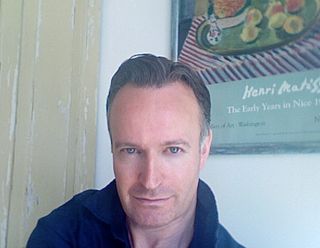A Quote by David Byrne
Maybe it's naïve, but I would love to believe that once you grow to love some aspect of a culture-its music, for instance -you can never again think of the people of that culture as less than yourself. I would like to believe that if I am deeply moved by a song originating from some place other than my own homeland, then I have in some way shared an experience with the people of that culture. I have been pleasantly contaminated. I can identify in some small way with it and its people.
Related Quotes
If you're part of any kind of writerly community, some of those people will have gone through MFA programs, and their thinking leaks into yours. So whatever changes MFAs have made to the culture, it's to the culture as a whole. It can't be pinned down to individual books in a way that some people would like to do.
There's this belief that some things can be taken seriously in an intellectual way, while some things are only entertainment or only a commodity. Or there's some kind of critical consensus that some things are "good," and some things are garbage, throwaway culture. And I think the difference between them, in a lot of ways, is actually much less than people think. Especially when you get down to how they affect the audience.
The real controversy comes with anthropologists - not all, but some - who see themselves as studying culture, and they then see culture from the perspective of humans, which is what they study. From their perspective, or, from some of their perspectives, it's sort of heresy to even talk about culture in any other animal. Others would say, "Yeah, you can talk about it, but our definitions of culture are so utterly different from yours and include things like values, and so on, which you've never shown to exist in any of these other creatures."
Some people are still very romantic! I mean, those funny vampire films are super romantic, and I don't think that's bad. It means there are a lot of people who still believe in love in a weird way. Okay, it's a cheesy way, and I guess if you think about it, you're like, "Wait, you can love them as long as they're dead?" Maybe that's the point. Maybe it's more twisted than I thought. You can love but you can't age.
The way two people can end up in the same place, find each other in a crowd, and change their lives and the lives of the people around them forever... It makes you believe in fate. And fate gives love some authority. Like it's been stamped with approval from above, if you believe in above. A godly green light. Some destined significance.
The changes that we can make in the culture can be there for people that we will never meet, that will never know us, and that's what keeps me up at night. It's what excites me about science, that we can learn ways of being with each other. And the behavioral sciences have not been enough of a part of cultural development. The physical sciences have; the behavioral sciences have not. And I would like to see if we can bring some things into human culture that would humanize and soften and empower people.
I drink much less than most people think, and I think much more than most people would believe. I am quite sincere about some of the things which people take very lightly, and almost insultingly unconcerned about some of the things which people take most seriously. In short, I am basically antisocial: certainly not to an alarming degree , but just more so than I appear to be.
Among the Indians, as among other nations, some people are born artists, but most are not. I am a born artist. I have as much interest in my people as any anthropologist, and I have studied our culture and lore. My aim is to reassemble the pieces of a once proud culture, and to show the dignity and bravery of my people.



































